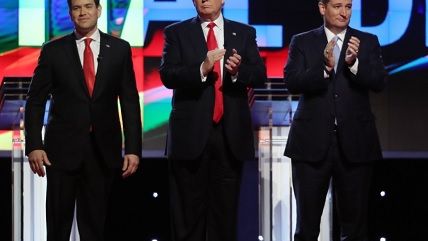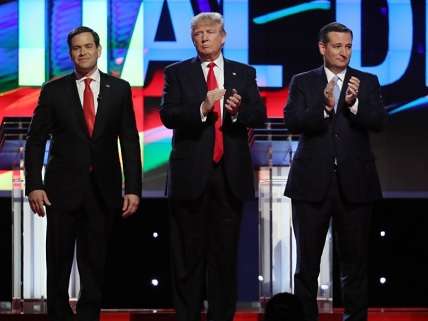GOP Candidates (Except Trump) Promise Not to Kill Families of Terrorism Suspects (Intentionally)
It's come to this.


The Republican candidates at last night's debate went on the record on the issue of targeting the families of terrorism suspects, an idea first floated by Donald Trump, who defended it at the debate. The other candidates opposed it.
This is what the debate on the war on terror looks like 15 years after 9/11—with the Republican frontrunner promising he will order the military to commit war crimes.
Well, first, Trump insists, he'll make such actions legal.
"Now, we have to obey the laws," Trump told the debate audience in Miami. "But we have to expand those laws, because we have to be able to fight on at least somewhat of an equal footing or we will never ever knock out ISIS and all of the others that are so bad."
Trump continued: "We better expand our laws or we're being a bunch of suckers, and they are laughing at us. They are laughing at us, believe me."
Asked whether he would pursue a policy of targeting the families of terrorism suspects, Marco Rubio said it wasn't necessary. Instead, he claimed U.S. intelligence agencies had been "hamstrung" and that unleashing them, as well as spending more money on the military, would "defeat terrorists." No specifics on what that would entail from Rubio.
Ted Cruz also rejected the idea of targeting families of terrorism suspects. "We've never targeted innocent civilians and we're not going to start now," he said, before offering empathy for the people who support such a position.
"But listen, Jake, I understand," Cruz said, referring to debate moderator CNN's Jake Tapper. "People are scared and for seven years, we've faced terrorist attacks and President Obama lectures Americans on Islamophobia. That is maddening."
Cruz then pivoted to the Iran deal, claiming Trump supported Hillary Clinton and John Kerry's efforts, and finally to the Israeli-Palestinian conflict, claiming Trump comments about being "neutral" in the conflict were actually anti-Israeli.
Unfortunately, Cruz wasn't asked how rejecting the idea of targeting families comports with his "make the sand glow" approach to destroying ISIS. Carpet bombing can catch plenty of innocent civilians with or without explicit acknowledgement of that.
Last week, Glenn Greenwald observed that many of Trump's "policy proposals" aren't contradictory to the U.S. mainstream but an "uncomfortable reflection of it." Trump's desire to kill the families of terrorism suspects fits into that—drone strikes are estimated to have killed about 5,000 people, and up to 1,000 of them may have been civilians. The numbers could be even higher, with the Obama administration working on releasing kill numbers for the drone only in the twilight of its term.
The U.S. often doesn't know the identity of who its killing; "signature strikes" rely on profiling. The U.S. has bombed wedding parties and emergency responders arriving at the scene of earlier strikes. Plenty of families have been killed already. These realities even inform our action movies. London Has Fallen revolves around a Paris-style terrorist attack targeting Western leaders over a drone strike that killed the family of a gun-running terrorist but not the terrorist himself. It includes a scene where the vice president (played by Morgan Freeman) and the terrorist leader exchange accusations over who sells weapons to bad guys. The U.S. is the number one arms merchant in the world.
Ted Cruz bemoans the president's rhetoric on Islamophobia because people are scared of terrorist attacks. Yet Obama's rhetoric on Islamophobia is also maddening because it doesn't acknowledge the role U.S. counterterrorism policies play in encouraging Islamophobia by overstating the threat of Islamist terror.
When the U.S. killed 150 Somalis last weekend, the military insisted they posed an "imminent threat" to U.S. forces in Somalia. U.S. foreign policy often contributes to the metastization of terrorist threats around the world. That contributes to Islamophobia and acclimates Americans to the idea of killing the families of terrorism suspects, creating the room for Donald Trump. When the U.S. killed 16-year-old Abdulrahman Al-Awlaki, the son of Anwar Al-Awlaki, both U.S. citizens, Robert Gibbs, a former Obama White House press secretary, said the boy should've had "a more responsible father."
Of course, President Obama says he has nothing to do with the rise of Trump either.


Show Comments (65)